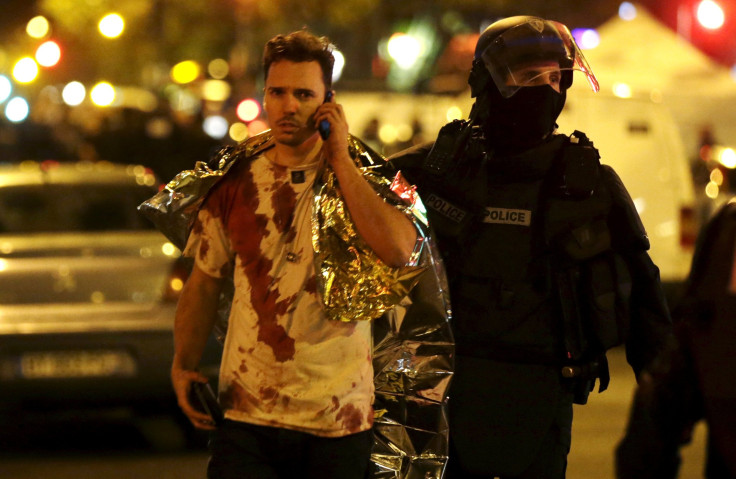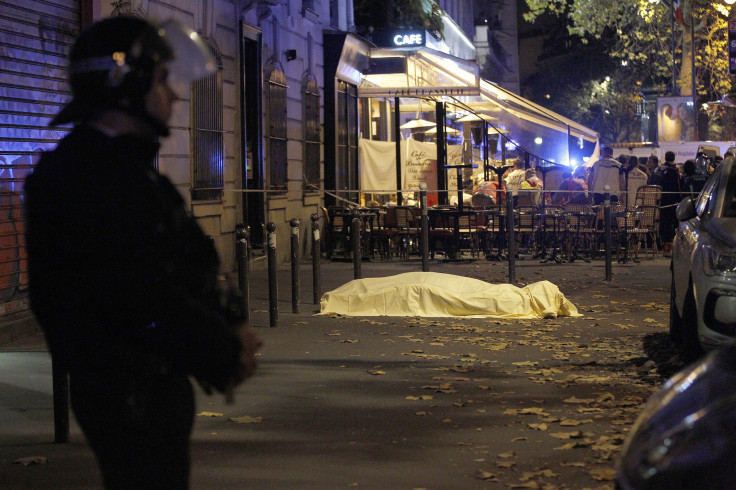'I Thought This Was The End'
On a cool night in Paris, a series of terrorist attacks left scores of people dead, and a nation deeply wounded for the second time this year.

The first sign that a seemingly ordinary November night in Paris was about to descend into tragedy emerged around 9 p.m. local time, with word that a shootout was unfolding at a crowded Cambodian noodle shop in the 10th Arrondissement, a trendy neighborhood popular with young people and tourists.
The Friday evening was packed with the usual activity of a weekend in one of the world’s most cosmopolitan cities. A soccer match featuring the French and German national teams was playing out at the Stade de France stadium in front of some 80,000 people, among them French President François Hollande. Roughly five miles away at the Bataclan Concert Hall, the Southern California rock band, the Eagles of Death Metal, were taking the stage as part of a European tour. Throughout the city, diners were piled into the thousands of eateries that have made Paris an international food mecca.
“I have never seen so many dead people around me in my life.”
Suddenly, a lone gunman reportedly wielding a Kalashnikov automatic rifle entered the noodle shop, Le Petit Cambodge. He opened fire, transforming the packed restaurant into a horror scene. By the time the counting was done, 14 people were dead and two others were injured.
“There were people on the ground, and I thought a car had driven into the Petit Cambodge Restaurant, because the window was smashed in,” a witness told Le Monde. “I didn't understand what had happened.”
This was merely the beginning of an apparently coordinated series of attacks that would play out at a half-dozen different venues across the French capital on this infamous night -- from the soccer stadium to a crowded neighborhood gathering place to the concert hall and at least one other restaurant. Before the grim arithmetic was complete, French authorities would tally at least 120 deaths, making this the worst terrorist attack in Europe since the 2004 Madrid train bombings.
As the news of the carnage seeped out across Paris and then around the globe, ricocheting across social media channels and dominating broadcast outlets, people struggled to understand what had unfolded beyond the awful essentials: For the second time in less than a year, Paris was again the epicenter of a lethal terrorist attack.
"I feel that all of a sudden there is war outside my door," one Parisian, Nathalie Chelou, told International Business Times. "I wonder what will happen tomorrow."
How these events unfolded -- committed by whom, and at what time, and in the service of what cause -- could not be fully discerned as Friday gave way to Saturday. Sympathizers of ISIS, the jihadist group that has established a self-proclaimed caliphate across great swaths of Iraq and Syria, were declaring victory, celebrating November 14 as a day that should stand alongside September 11 as a milestone in the ruthless killing of Western enemies. But the leadership of ISIS had not taken credit for the acts, and the people who allegedly did the killing could not be consulted: The French authorities said that eight had been killed -- either by stormtroopers or by their own hand -- and more were potentially at large.
What follows here is the best available timeline that could be fashioned early Saturday; a timeline subject to change as new facts emerge.
Le Petit Cambodge was not the only restaurant hit Friday night. Violence also unfolded at La Belle Equippe, a busy cafe and restaurant in the 11th arrondissement at the corner of Rue de Charonne and Rue Faidherbe. Roughly a dozen people died at the neighborhood brasserie.
“I heard detonations and went to the window,” a witness told Le Monde. “I have a direct view of the café. I saw a man getting out of a car and firing on the terrace, by guesswork. He shot many times, in gusts. I heard cries. Then the man got back in his car and left, just like that.”
Not long after the bullets tore through the restaurants, explosions reverberated through the national soccer stadium.
“I thought this was the end. I thought I’m finished, I’m finished. I was terrified.”
It was still early in the game, in the first half of an exhibition match with bitter rival Germany. The roars of cheering fans had yet to hit critical mass as the explosions ripped through stadium. The first round, at around 9:20 p.m., was short and loud.
"We heard them, but we thought they were home-made devices or fireworks," one fan in attendance, Frederic Lavergne, told the Associated Press."We had no idea at the time what it was."
The next explosion followed minutes later.
“If you ever have been to a large soccer game, it is not unusual to hear fireworks,” freelance reporter Ben Barnier told NPR. “But this time, the two explosions were much larger than fireworks and shortly after, we heard police sirens which indicated that something unusual might have happened indeed.”
Security guards hustled President Hollande out of the stadium. The game continued as if nothing unusual had transpired, Barnier said, but as the sporting event went on, people’s eyes shifted from the field to their mobile phones, which flashed updates on the terrorist attacks that were at that moment unfolding just outside the stadium walls. Helicopters circled overhead, while thousands of spectators entered the pitch of Stade de France stadium, reported the Associated Press. Fans who wanted to leave the stadium before the game finished were initially not permitted to do so.
President of the French Football Federation, Noël Le Graët, said officials decided against informing the crowds about the attacks initially in order to prevent panic, according to Fox Sports.
The French and German players finished the game, with France winning 2-0, before attendees were allowed to leave. An announcer came over the stadium loudspeaker to tell fans to exit, but avoid certain gates, according to Fox Sports. Some fans were hesitant to leave, staying 30 minutes after the game came to a close.
The scenes inside the Stade de France as spectators are asked to leave through specific gates. #FRAGER #Paris
pic.twitter.com/UHhwts7KyZ
— Kieran (@FootyAntics) November 13, 2015Police were stationed outside to help evacuate the distressed crowds. It is not clear how many explosions detonated outside of the stadium. At least one of the explosions was the work of a suicide bomber, local French news outlets reported. At least four people were killed in the blasts, according to CNN.
The scene outside the stadium was oddly calm: Some fans left the premises singing France’s national anthem, the Marseillaise. “To arms, to arms, ye brave,” fans chanted in French in a Facebook video.
But while the soccer game played to conclusion, the violence delivered an abrupt change of scene at the Bataclan concert hall. There, a hail of gunfire quickly turned the event from festive to terrifying.
The Eagles of Death Metal were on tour to promote their new album, “Zipper Down,” their first release in seven years. They were nearly an hour into their set when one attendee, Jerome Boucer, heard what sounded like firecrackers.
“It was loud but the gig was very loud, and I thought it was something that was part of the show. I think lots of people did, too,” Boucer told The Guardian.
“Then they started firing,” he said.
"They" were the men in black clothing who reportedly broke into the theater armed with automatic weapons, one witness told E1 -- no difficult feat, given the absence of metal detectors and the lack of pat downs and bag searches on entry. They simply walked in, the way the rest of the crowd did, and began firing on the hundreds of concerts goers.
“There were wounded, there was a lot of blood,” Boucer said. “Blood everywhere.”
The assailants took hostages and began shooting them one by one as they lay helplessly on the ground, execution style, according to multiple reports. Perhaps 100 people died there.

"They were not moving," Julien Pearce, a radio reporter told CNN. "They were just standing at the back of the concert room and shooting at us. Like we were birds."
As the killing played out for ten minutes, fans lay on the floor of the arena, covering their heads with their hands. The attackers took a short break to reload their weapons, and Pearce made a break for the exits alongside others.
"They reloaded again, and we ran," Pearce said.
As he ran out, Pearce encountered a teenage girl who'd been hit by gunshots. Pearce told CNN he put her on his back and ran for hundreds of meters before putting the survivor into a taxi and telling the driver to head for the hospital.
As he spoke with CNN outside of the Bataclan, Pearce continued communicating via text message with friends who remained at the venue. Pearce’s friends were not the only ones asking for help with their smartphones. Benjamin Cazenoves, whose Facebook profile lists him as working in Paris, wrote to his friends on Facebook that he remained at the Bataclan “hurt bad.”
“There are survivors inside,” Cazenoves wrote. “They are cutting down all the world. One by one.”
Some inside were able to shield themselves from the mayhem by quickly escaping into an attic compartment at the venue and hiding there, according to various survivor accounts tweeted by Elise Barthet, a journalist for Le Monde, the French newspaper.
"I do not know what was worse: see the dead down in the ditch in the first minutes, or waiting in the" attic, said John B., according to Barthet.
As they waited, some of the survivors heard the attackers say, this is "the fault" of President Hollande, Barthet reported, quoting another survivor. The hostages hid wherever they could until French forces broke in to rescue them.
“I thought this was the end. I thought I’m finished, I’m finished. I was terrified,” Marc Coupris, 57, told The Guardian. “Eventually, when a few gendarmes came in slowly we began to look up and there was blood absolutely everywhere. The police told us to run.”
After the rescue, survivors gathered at nearby bars, where they were comforted and kept warm with blankets as journalists and police took their accounts of what happened. CNN reported that at least 100 hostages managed to be rescued.
“I have never seen so many dead people around me in my life,” survivor Jasmine told BFM TV, a French TV news channel. “I am traumatized."
Amid the terror and the sorrow, other emotions were welling to the surface.
“Most people I have talked to are more angry than anything else,” Danielle Pacelli, 23, an American working as an au pair outside Paris, told IBT. “There is a sense of national outrage. People are also scared, including me. It is hard to feel safe when people are being gunned down and slaughtered in theaters and restaurants.”
© Copyright IBTimes 2024. All rights reserved.






















